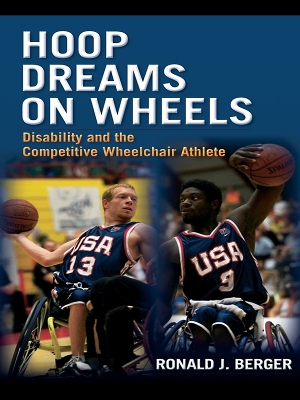Contemporary Sociological Perspectives
2 total works
Hoop Dreams on Wheels is a life-history study of wheelchair athletes associated with a premier collegiate wheelchair basketball program. The book, which grapples with the intersection of biography and history in society, situates the study in broader context with background on the history and sociology of disability and disability sports. It documents the development and evolution of the basketball program and tells the individual life stories of the athletes, highlighting the formative interpersonal and institutional experiences that influenced their agentive actions and that helped them achieve success in wheelchair sports. It also examines divisions within the disability community that reveal both empowering and disempowering aspects of competitive wheelchair athletics, and it explores some of the complexities and dilemmas of disability identity in contemporary society.
The book is intended to be read by a general audience as well as by students in college courses on disability, sports, social problems, deviance, medical sociology and anthropology, and introductory sociology. It also will be of interest to scholars in the sociology of disability, sociology of sports, and medical humanities, as well as life-history researchers and professionals in the fields of physical education, therapeutic recreation, and rehabilitative counseling.
Surviving the Holocaust is a compelling sociological account of two brothers who survived the Holocaust in Nazi-occupied Poland. One brother, the author’s father, endured several concentration camps, including the infamous camp at Auschwitz, as well as a horrific winter death march; while the other brother, the author’s uncle, survived outside the camps by passing as a Catholic among anti-Semitic Poles, including a group of anti-Nazi Polish Partisans, eventually becoming an officer in the Soviet army.
As an exemplary "theorized life history," Surviving the Holocaust applies concepts from life course theory to interpret the trajectories of the brothers’ lives, enhancing this approach with insights from agency-structure and collective memory theory. Challenging the conventional wisdom that survival was simply a matter of luck, it highlights the prewar experiences, agentive decision-making and risk-taking, and collective networks that helped the brothers elude the death grip of the Nazi regime. Surviving the Holocaust also shows how one family’s memory of the Holocaust is commingled with the memories of larger collectivities, including nations-states and their institutions, and how the memories of individual survivors are infused with collective symbolic meaning.

